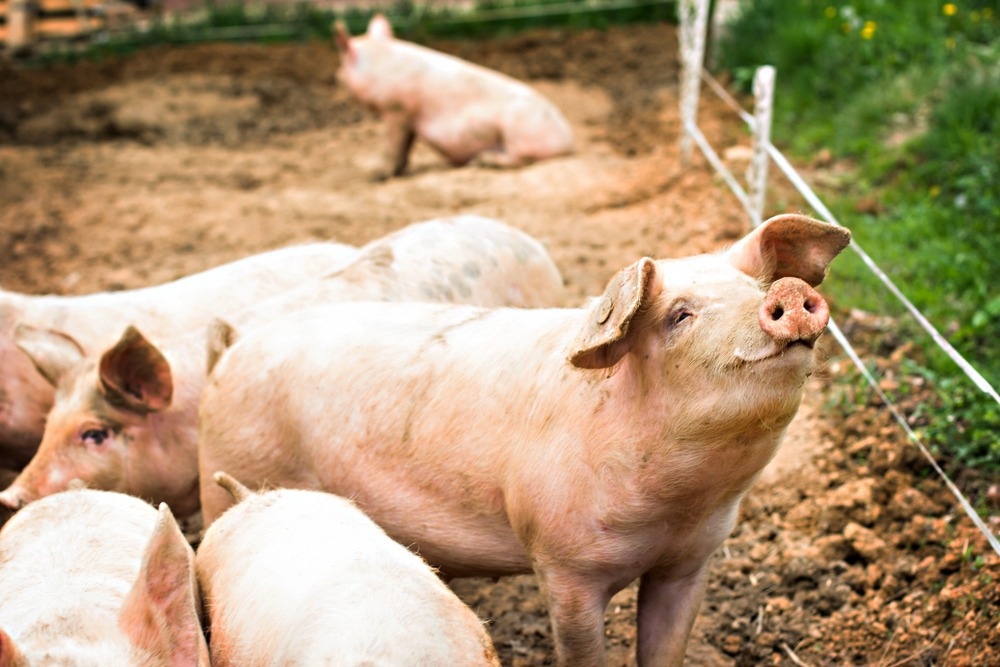New research headed by the University of Oxford has revealed that overuse of antimicrobials in livestock production can lead to the evolution of bacteria more resistant to the first line of the human immune response. The findings were published today in eLife. They show that farmed chickens and pigs could possess huge reservoirs of cross-resistant bacteria, which are capable of powering future epidemics.

Image Credit: Julia Lototskaya/Shutterstock.com
One of the most adverse risks to global health is drug-resistant infection, and there is a growing need to develop novel, effective antimicrobials. Antimicrobial peptides (AMPs) could be one likely solution. These are compounds that are naturally created by a majority of living organisms, such as animals, and have significant roles in innate immunity, the first line of defense against bacterial infections.
Some AMPs, however, are also employed extensively in livestock production, both as growth promoters and to control infections. This has given rise to fears that agricultural AMP usage may produce cross-resistant bacteria that could further overcome the human innate immune response.
In this new research, headed by the University of Oxford, scientists have established that the evolution of those cross-resistant bacteria is not only feasible but also highly possible.
To assess this thought, the scientists employed colistin, an AMP generated by a bacterium (Bacillus polymyxa) that is functionally and chemically identical to AMPs produced in animals. Colistin has turned into increasingly significant as a “last line of defense” for curing infections caused due to multidrug-resistant bacteria. Nevertheless, since the 1980s, the widespread use of colistin in livestock production has influenced the spread of E.coli bacteria that carry mobile colistin resistance (MCR) genes.
In this research, E.coli carrying an MCR gene (MCR-1) were exposed to AMPs, which are known to serve significant roles in in-built immunity in pigs, chickens, and humans. The bacteria were also assessed for their vulnerability to human serum, which comprises a complicated cocktail of antimicrobial compounds, and for their capacity to infect wax moth larvae (Galleria mellonella).
Our study clearly shows that anthropogenic use of antimicrobial peptides such as colistin can drive the accidental evolution of resistance to the innate immune system of humans and animals. This has major implications for the design and use of therapeutic antimicrobial peptides and suggests that resistant genes may be difficult to eradicate, even if antimicrobial peptide use in agriculture is withdrawn.”
Professor Craig MacLean, Department of Biology, University of Oxford
The findings establish that bacterial AMPs’ usage in agriculture can produce widespread cross-resistance to the human in-built immune response.
As per scientists, cross-resistance to human AMPs could be widespread, provided that AMPs tend to have identical cellular targets and physico-chemical properties. In agriculture, chickens and pigs are already known to serve as chief reservoirs of colistin-resistant E.coli.
AMPs have been advocated as a promising alternative to antibiotics for treating bacterial infections. Using AMPs in this way will lead to the evolution of AMP resistance in pathogenic bacteria. Our results provide strong evidence that we will need to properly assess the impacts of resistance to new therapeutic AMPs on bacterial virulence before they are used to treat patients. If not, we will run the risk of accidentally arming pathogenic bacteria against our own immune system.”
Professor Craig MacLean, Lead researcher, Department of Biology, University of Oxford
This new study shows that colistin resistance is probably even more dangerous than previously thought. It is astonishing that so many governments, like the UK’s, are refusing to ban colistin use in farming. It is also remarkable that the British government is still opposed to banning preventative mass medication of intensively farmed animals with antibiotics, even though the EU banned such use over a year ago.”
Cóilín Nunan, Scientific Adviser, Alliance to Save Our Antibiotics
Antimicrobial peptides, including colistin, have been heralded as a potential part of the solution to the rise of multidrug-resistant infections. This study, however, suggests that resistance to these antimicrobials may have unintended consequences on the ability of pathogens to cause infection and survive within the host. This is particularly worrying because it suggests that E. coli carrying the MCR-1 gene may have a clear selective advantage even if the use of colistin is carefully controlled.”
Dr Jessica Blair, University of Birmingham
Blair is also the editor-in-chief of NPJ Antimicrobials and Resistance.
Source:
Journal reference:
Jangir, P. K., et al. (2023). The evolution of colistin resistance increases bacterial resistance to host antimicrobial peptides and virulence. eLife. doi.org/10.7554/eLife.84395.